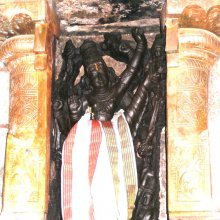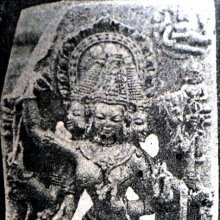Three Worlds: 2 definitions
Introduction:
Three Worlds means something in Buddhism, Pali, Hinduism, Sanskrit. If you want to know the exact meaning, history, etymology or English translation of this term then check out the descriptions on this page. Add your comment or reference to a book if you want to contribute to this summary article.
Images (photo gallery)
In Hinduism
Purana and Itihasa (epic history)
Source: Wisdomlib Libary: The Brahmāṇḍa-purāṇaThree Worlds or trailokya refers to Bhūta (past), Bhavya (future) and Bhavat (present), according to the Brahmāṇḍa-purāṇa 2.38. Accordingly, “The Indras of all the Manvantaras of the past (bhūta), present (bhavat) and future (bhavya) should be known as having equal (similar) characteristic features. [...] It is remembered by the Brāhmaṇas that Bhūta, Bhavya and Bhavat are the three worlds. This Bhūrloka (Earth) is remembered as Bhūta; the Antarīkṣa (Atmosphere) is remembered as Bhavat. The Diva (Heaven) is remembered as Bhavya”.

The Purana (पुराण, purāṇas) refers to Sanskrit literature preserving ancient India’s vast cultural history, including historical legends, religious ceremonies, various arts and sciences. The eighteen mahapuranas total over 400,000 shlokas (metrical couplets) and date to at least several centuries BCE.
In Buddhism
General definition (in Buddhism)
Source: Google Books: the literature of the personalists of early buddhismThe Three Worlds include all living beings up to those who have attained parinirvāṇa without a remainder (nirupadhiśeṣa) and consists of:
- the elements of the world of desire (kāmadhātu);
- the elements of the world of subtle form (rūpadhātu); and
- the elements of the formless world (ārūpyadhātu).
See also (Relevant definitions)
Partial matches: Three.
Full-text (+1415): Trailokya, Tribhuvana, Jagattraya, Bhuvanatraya, Triloka, Lokatraya, Triloki, Bhavitra, Trijagat, Trivikrama, Bhuvana, Lokatrayi, Trailokyadhipati, Tribhuvanajanani, Mujaga, Mujjaga, Munela, Traivargika, Trailokyarajya, Jagatatraya.
Relevant text
Search found 196 books and stories containing Three Worlds; (plurals include: Three Worldses). You can also click to the full overview containing English textual excerpts. Below are direct links for the most relevant articles:
The Skanda Purana (by G. V. Tagare)
Chapter 24 - Mahālayeśvara (mahālaya-īśvara-liṅga) < [Section 2 - Caturaśīti-liṅga-māhātmya]
Chapter 9 - Dispute between Brahmā and Viṣṇu < [Section 3b - Arunācala-khaṇḍa (Uttarārdha)]
Chapter 171 - Greatness of Daśaratheśvara (Daśaratha-īśvara) < [Section 1 - Prabhāsa-kṣetra-māhātmya]
Brihad Bhagavatamrita (commentary) (by Śrī Śrīmad Bhaktivedānta Nārāyana Gosvāmī Mahārāja)
Verse 2.2.24 < [Chapter 2 - Jñāna (knowledge)]
Verse 2.2.42 < [Chapter 2 - Jñāna (knowledge)]
Verse 2.2.61 < [Chapter 2 - Jñāna (knowledge)]
The Garuda Purana (by Manmatha Nath Dutt)
Chapter XXIX - Mantras to be used in connection with the worship of Shridhara manifestation of Vishnu < [Agastya Samhita]
Chapter XX - Mantra-cures (curative formulas) of snakebite as narrated by Shiva < [Agastya Samhita]
Chapter CXXV - The Ekadasi Vratam < [Brihaspati (Nitisara) Samhita]
The Agni Purana (by N. Gangadharan)
Chapter 307 - Description of the mantras that would stupefy the three worlds
Chapter 134 - Sacred formula for the conquest of Three Worlds (trailokya-vijaya-vidyā)
Chapter 296 - The five constituents of the worship of Rudra (pañcāṅga-rudra)
The Padma Purana (by N.A. Deshpande)
Chapter 231 - Durvāsas Curses Indra < [Section 6 - Uttara-Khaṇḍa (Concluding Section)]
Chapter 8 - Prelude to the Churning of Ocean < [Section 4 - Brahma-khaṇḍa (Section on Brahman)]
Chapter 239 - The Rise of Bali and Kaśyapa’s Penance < [Section 6 - Uttara-Khaṇḍa (Concluding Section)]
Chaitanya Bhagavata (by Bhumipati Dāsa)
Verse 3.4.321 < [Chapter 4 - Descriptions of Śrī Acyutānanda’s Pastimes and the Worship of Śrī Mādhavendra]
Verse 1.2.55 < [Chapter 2 - The Lord’s Appearance]
Verse 1.9.43 < [Chapter 9 - Nityānanda’s Childhood Pastimes and Travels to Holy Places]
Related products







